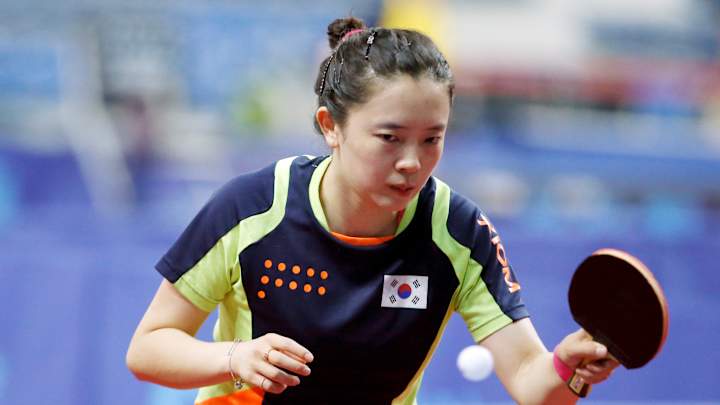Chinese table tennis domination leads to exodus of talent

SEOUL, South Korea (AP) South Korea's top female table tennis player, China-born Jeon Ji-hee, has an easy explanation for why she had to leave her homeland to compete in the game she loves.
''There are way too many good players in China,'' Jeon said after a pre-Olympics practice session. ''It's extremely hard to make it to the national team.''
This simple recognition has led to an exodus of Chinese talent - and to worries that it will take more than the wanderings of China's second-tier athletes to save a sport so thoroughly dominated by one nation.
At the Rio Olympics, China will not only have the world's best table tennis players, but also will have produced the best players on the rosters of many other national squads.
Unrelenting dominance by one country of a sport isn't unusual, of course, but China's table tennis supremacy is on a different level. Some believe that for the sport to thrive other nations must have some hope of winning on an international stage every now and then - and not just with outside Chinese talent.
Table tennis in China, despite what some see as a dip in its popularity, remains a source of national pride. A highly developed infrastructure scouts talented young athletes, often in kindergarten, and then grooms them into world beaters.
The success of this system is reflected in Olympic gold: China has won all but four gold medals since table tennis became an Olympic sport in 1988.
Before the 2012 Olympics in London, a rule change allowed each country to only put forward two players for singles. China rolled on regardless, winning all the golds and silvers for singles, and leaving bronze for the rest of the world.
The exodus of Chinese players is partly explained by the intense competition to make the national team. Current world No. 1 Liu Shiwen, for instance, didn't get one of China's two spots for singles.
With so much talent, many Chinese players must contemplate a move abroad for a shot at the Olympics.
The United States has two players who started their careers in China, including Yue ''Jennifer'' Wu. Three of the players on Australia's six-person team were born in China and a fourth was born in Melbourne to Chinese parents.
Only three nations in the women's competition in 2012 were without a China-born player, or a player with Chinese roots - Egypt, North Korea and Japan.
A major reason for China's success in table tennis is an intense, some might say obsessive, dedication to training; it also partially explains why some players leave.
One of the Australian team members, Jian Fang Lay, used to run away after school to avoid her coaching sessions in China, according to the Australian Olympic Committee's website.
Kai Zhang, a China-born player hoping to make the 2020 U.S. Olympics team, said coaches in China required even the sick and injured to train.
''If you want to be a world champion, it is better to train in China,'' Zhang said in an interview posted on the USA Table Tennis website last year. ''But if you want to have a balanced life and want to be happy and free, then training in the U.S. is better.''
China's talent identification system is also more advanced than other countries.
''China trains a huge number of players from a young age. South Korea simply waits for a talented one to be found,'' said Kim Taeksoo, a South Korean former Olympic player. ''If there are no talented young players that are being nurtured, the chances of beating Chinese players are very low.''
China seems to recognize a need to help the rest of the world catch up.
Officials have made efforts to try to nurture talent in other countries, allowing foreign players to attend table tennis schools in Chinese provinces, for example, and sending Chinese coaches abroad, Zhao Xia, a Chinese Table Tennis Association official said.
Far from resenting the exodus of talented players, China encourages and supports them, said a national table tennis association official who would only give his surname, Wang, because he wasn't authorized to speak to the media.
''It's possible that those players might beat Chinese national team players, but still, it is in China that they acquired their skills and tactics,'' Wang said.
From a purely athletic perspective, watching two world-class athletes compete in long rallies that often seem to test the laws of physics with chopping spin shots and powerful smashes can be entertainment enough, even if both players happen to be Chinese.
But the Olympics are often a nationalistic affair, and many people won't tune in unless their country has a chance at winning.
''One country being far too good ruins the sportsmanship and the fun part of it,'' Kim, the South Korean Olympian, said. ''Most European and Asian countries are losing table tennis fans.''
For the players who leave China to compete for new countries, there can also be psychological strain.
''When you don't know the opponent, you don't feel anything emotionally,'' said Jeon, the China-born ace for South Korea. ''But because I know (the Chinese players) and have trained there ... my thoughts become complicated.''
---
AP journalists Jungho Choi in Seoul, Dennis Passa in Australia and Yu Bing in Beijing contributed to this report.
---
Foster Klug, AP's bureau chief in Seoul, South Korea, is covering table tennis and badminton in Rio. Follow him at www.twitter/apklug
